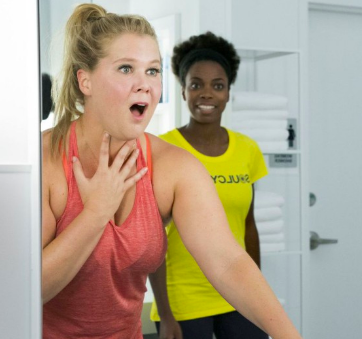We went to see I Feel Pretty this week to understand what all the controversy was about. Renee, the lead character played by Amy Schumer, is low in self-confidence at the outset of the movie and makes a wish to be beautiful. That wish is fulfilled when she hits her head at a SoulCycle class and wakes up from a concussion believing she is beautiful. From there the movie follows Renee through a comedy of errors in which she, still an ordinary looking woman, believes herself to be extraordinarily beautiful. However, the people around her see her as the same way she has always looked.
Renee’s inaccurate self-perception leads her to approach a variety of situations in which her belief that she is beautiful allows her to act “confidently” with men, at work at a large beauty company and in other social situations involving her friends. Strangers continue to treat her awkwardly, if not dismissively, based on her looks, but she does not pick up on their treatment of her. The movie climaxes in a scene in which Renee realizes she looks the same as she has always looked and that her “beauty” didn’t exist at all. Propelled by this realization, Renee launches into a rousing speech in front of a large audience about how girls are so confident when they are young and then lose their confidence. (She also apologizes to her friends whom she has totally dissed, redefines her entire concept of beauty and makes up with her lovely and ordinary boyfriend.)
I’m not sure I would call the movie controversial as much as I would call it misguided. Ultimately, the message at the end of the movie is a good one: We are so confident as girls and then we lose our confidence and become women with low self-esteem. We need to change that reality. I don’t think anyone would disagree with that premise. And certainly, at Dynamo Girl, we work to counteract the trend of girls losing their confidence as they enter pre-adolescence and later. However, the problem with I Feel Pretty isn’t the ultimate message, it’s the troubling and convoluted path it takes to get there.
First, Renee only gains “confidence” because she believes herself to be beautiful. Meanwhile, the rest of the world treats her as if she’s an ugly pariah because her looks have not in fact changed. This is kind of absurd even in the world of over-exaggerated comedy because if you have ever seen Amy Schumer, she’s certainly attractive and an average sized person. Secondly, while the movie wants to portray Renee as super-confident when she is under the illusion that she is beautiful, instead, she is comes across as arrogant, tone deaf and socially impaired.
If the goal of the movie is to represent a person who has unfettered confidence, it fails. If the goal of the movie is to provide a role model of an ordinary looking woman, living an ordinary life and discovering great self-confidence, it fails. If the goal of the movie is to prove the age-old adage that beauty is skin deep and substance is truly what matters, it fails. Ultimately, one final speech about not losing our self-confidence does not an empowered movie make.
Here is what the movie does do. It makes us think about the pressure we are all under to be pretty in a way that is consistent with society’s narrow parameters. It challenges us to think about how women are often judged by our book covers even when we want to reject the notion of one standard of beauty. We continue to feel inadequate even when we know the expectations of beauty are bogus and so deeply limited. And ultimately, we find it so hard to not to place those same unrealistic and narrow standards on our daughters. We have internalized those standards in our own minds, but if we continue to place those standards on our girls, we are only perpetuating them. Even if we cannot free ourselves from the judgment of looking a certain way, perhaps we can at least free our daughters from that judgment. While I Feel Pretty is not a movie to see with your daughters, it can be a movie to see with other adults to challenge our thinking about our bodies and our judgment of others based on their appearances.







